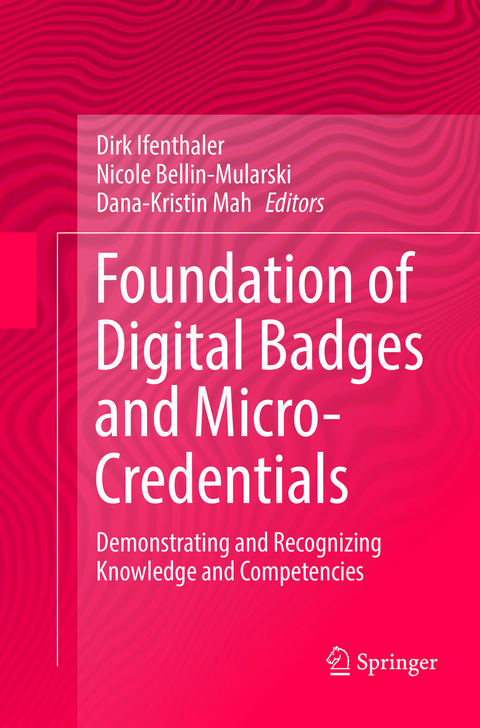
Foundation of Digital Badges and Micro-Credentials
Springer International Publishing (Verlag)
978-3-319-79218-7 (ISBN)
This edited volume provides insight into how digital badgesmay enhance formal, non-formal and informal education by focusing on technicaldesign issues including organizational requirements, learning and instructionaldesign, as well as deployment. It features current research exploring thetheoretical foundation and empirical evidence of the utilization of digitalbadges as well as case studies that describe current practices and experiencesin the use of digital badges for motivation, learning, and instruction in K-12,higher education, workplace learning, and further education settings.
His previous roles include Professor and Director, Centre for Research in Digital Learning at Deakin University, Australia, Manager of Applied Research and Learning Analytics at Open Universities Australia, Professor for Education and Interim Department Chair at the University of Mannheim, Germany, as well as Associate Professor for Instructional Design at the University of Freiburg, Germany. He is the Editor-in-Chief of the Springer journal Technology, Knowledge and Learning and a member of the Editorial Board for Educational Technology Research and Development. Dirk is the 2013-2014 President for the AECT Design and Development Division, 2013-2015 Chair for the AERA Special Interest Group Technology, Instruction, Cognition and Learning and Co-Program Chair for the international conference on Cognition and Exploratory Learning in the Digital Age (CELDA). Nicole Bellin Mularski is a research assistant at the Department of Applied Teaching and Learning Research at the University of Potsdam, Germany. She received her M.A. and Phd from Freie Universität Berlin, Germany and eventually worked as a research assistant in the fields of curriculum development, at the Technische University of Dresden and school development of full-day schools, and SES and migration related achievement disparities in elementary education at the Department of Empirical Education at the Freie Universität Berlin. She received her M.A. in Educational Science from the Berlin Institute of Technology, Germany, including a semester at Stockholm University, Sweden. She worked as research assistant in the fields of higher education, analysing doctoral candidates’ supervision and students’ satisfaction within their university.
Part ITheoretical Foundation of Digital Badges.- Chapter 1 Digital Badges andMicro-Credentials: Historical Overview, Motivational Aspects, Issues, andChallenges.- Chapter 2 A Philosophy of Open Digital Badges.- Chapter 3 KeepCalm and credential On: Linking Learning, Life and Work Practices in a ComplexWorld.- Chapter 4 Drivers, Affordances and Challenges of Digital Badges.-Chapter 5 Evaluating the Public Promise.- Chapter 6 Building Collective Beliefin Badges: Designing Trust Networks.- Chapter 7 Learning Journeys in HigherEducation: Designing Digital Pathways Badges for Learning, Motivation andAssessment.- Part II Technological Frameworks and Implementation.- Chapter 8Badging Platforms: A Scenario-based Comparison of Features and Uses.- Chapter 9Adopting Digital Badges in Higher Education: Scoping the Territory.- Chapter 10Passport to Designing, Developing and Issuing Digital Instructional Badges.-Chapter 11 Transforming Workplace Learning Culture with Digital Badges.-Chapter 12 The Role of Endorsement in Open Badges Ecosystems.- Chapter 13Implementing a Badging System Faculty Development.- Part III Learning andInstructional Design Considerations.- Chapter 14 Toward a ComprehensiveTheoretical Framework for Designing Digital Badges.- Chapter 15 Digital Badgesand Micro-credentials: Digital Age Classroom Practices, Design Strategies, andIssues.- Chapter 16 Digital Badges: Purposeful Design in Professional LearningOutcomes for K-12 Educators.- Chapter 17 Height vs Depth in Badging Framework Design.-Chapter 18 What We Can Learn about Digital Badges from Video Games.- Chapter 19Digital Badges as (parts of) Digital Portfolios: Design Patterns forEducational and Personal Learning Practice.- Chapter 20 Badge Claims:Creativity, Evidence and the Curated Learning Journey.- Part IV Case Studies:Practices and Experience.- Chapter 21 Digital Badges for ProfessionalDevelopment: Teachers' Perceptions of the Value of a New CredentialingCurrency.- Chapter 22 When Digital Badges Work: It's Not About the Badges, It'sAbout Learning Ecosystems.- Chapter 23 The Authority Behind the Badge: APractice Analysis Case Study.- Chapter 24 Student Perceptions of Digital Badgesas Recognition of Achievement and Engagement in Co-Curricular Activities.-Chapter 25 Applied Gamification: Creating Reward Systems for OrganizationalProfessional Development.- Chapter 26 Implementing Digital Badges in Australia:The Importance of Institutional Context.- Chapter 27 Development andImplementation of Digital Badges for Learning Science, Technology, Engineeringand Math Practices in Secondary Contexts: A Pedagogical Approach with EmpiricalEvidence.- Epilogue.- Chapter 28 Moving Forward with Digital Badges inEducation.
| Erscheinungsdatum | 05.03.2022 |
|---|---|
| Zusatzinfo | XXVIII, 530 p. 47 illus., 23 illus. in color. |
| Verlagsort | Cham |
| Sprache | englisch |
| Maße | 155 x 235 mm |
| Gewicht | 8365 g |
| Themenwelt | Schulbuch / Wörterbuch ► Unterrichtsvorbereitung ► Unterrichts-Handreichungen |
| Geisteswissenschaften ► Psychologie ► Allgemeine Psychologie | |
| Geisteswissenschaften ► Psychologie ► Pädagogische Psychologie | |
| Sozialwissenschaften ► Pädagogik ► Schulpädagogik / Grundschule | |
| Schlagworte | digital badges • Educational technology • Learning and Instruction • Learning Environments • micro-credentials • technology and the classroom • technology integration in learning and instruction |
| ISBN-10 | 3-319-79218-0 / 3319792180 |
| ISBN-13 | 978-3-319-79218-7 / 9783319792187 |
| Zustand | Neuware |
| Haben Sie eine Frage zum Produkt? |
aus dem Bereich


